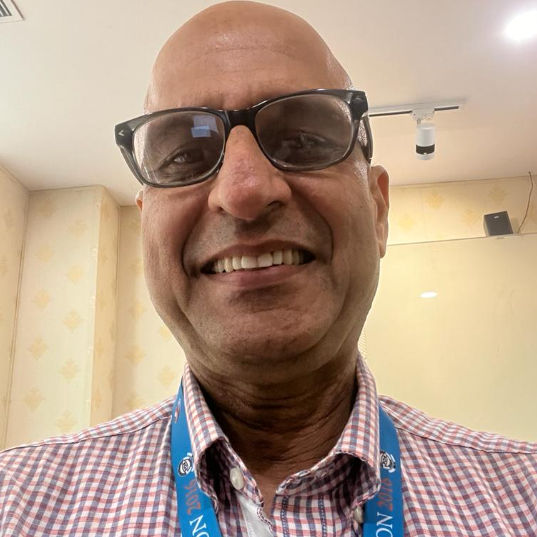How To Reduce Floaters Naturally?
Discover natural methods to reduce eye floaters. Learn about lifestyle changes, eye exercises, and dietary adjustments that may help improve eye health and minimize the appearance of floaters without surgery.

Written by
Last updated on 3rd Jul, 2025
Have you ever noticed tiny spots, cobwebs, or squiggly lines drifting across your vision, especially when looking at a bright background like a clear sky or a white wall? These are called eye floaters, and while they can be annoying, they’re usually harmless. However, if they suddenly increase or are accompanied by flashes of light, it’s important to see a doctor immediately.
For those who experience mild floaters and want to reduce them naturally, here are some helpful tips.
What Are Eye Floaters?
Eye floaters are tiny clumps of gel or cells inside the vitreous humor, the jelly-like substance that fills your eyeball. As we age, the vitreous becomes more liquid, and small fibers can clump together, casting shadows on the retina—which we see as floaters.
Common Causes of Floaters:
Aging (most common cause)
Eye injuries or inflammation
Nearsightedness (myopia)
Diabetes-related eye changes
Retinal tears or detachment (medical emergency)
Consult Top Ophthalmologists For More Causes Of Eye Floaters
Natural Ways to Reduce Floaters
While floaters don’t always disappear completely, these natural methods may help reduce their appearance and improve eye health.
1. Stay Hydrated
Dehydration can make floaters more noticeable. Drinking enough water keeps the vitreous gel healthy and may prevent floaters from worsening. Aim for 8-10 glasses of water daily.
2. Eat a Nutrient-Rich Diet
Certain nutrients support eye health and may help reduce floaters:
Vitamin C (citrus fruits, bell peppers, strawberries) – Supports collagen in the eyes.
Vitamin E (nuts, seeds, spinach) – Protects eye cells.
Zinc (beans, lentils, pumpkin seeds) – Helps maintain retina health.
Omega-3 fatty acids (fish, flaxseeds, walnuts) – Reduce inflammation.
3. Reduce Eye Strain
Staring at screens for long periods can make floaters more noticeable. Follow the 20-20-20 rule:
Every 20 minutes, look at something 20 feet away for 20 seconds.
4. Protect Your Eyes from UV Rays
Wearing sunglasses with UV protection can prevent eye damage that may worsen floaters.
5. Gentle Eye Exercises
Simple eye movements may help shift floaters out of your central vision:
Roll your eyes slowly in circles.
Look up and down, then side to side.
Focus on a distant object, then a near one (helps relax eye muscles).
6. Get Enough Sleep
Poor sleep can strain your eyes and make floaters more bothersome. Aim for 7-8 hours of quality sleep each night.
7. Manage Stress
Stress and anxiety can make you more aware of floaters. Try relaxation techniques like:
Deep breathing
Meditation
Yoga
8. Avoid Excessive Caffeine and Alcohol
Too much caffeine or alcohol can dehydrate you, making floaters more noticeable. Moderation is key.
When to See a Doctor
While most floaters are harmless, seek immediate medical attention if you notice:
Sudden increase in floaters
Flashes of light
Loss of peripheral vision
A dark curtain over your vision
These could be signs of a retinal tear or detachment, which requires urgent treatment.
Can Floaters Be Treated Medically?
If floaters severely affect your vision, an eye specialist may recommend:
Laser therapy (vitreolysis) – Breaks up large floaters.
Vitrectomy – Surgical removal of the vitreous gel (rare, only for severe cases).
However, these treatments have risks, so natural management is usually preferred for mild cases.
Conclusion
Floaters are a common part of aging, but simple lifestyle changes can help reduce their impact. Stay hydrated, eat well, protect your eyes, and manage stress. If floaters suddenly worsen, don’t ignore them—consult an eye specialist immediately.
If you’re concerned about your eye health, Apollo 24|7 offers expert consultations and eye tests. Book an appointment today for a thorough check-up!
Consult Top Ophthalmologists
Consult Top Ophthalmologists For More Causes Of Eye Floaters
Dr. S Venkateswaran
Ophthalmologist
35 Years • MBBS, PGD (OPTHALMOLOGY)
Tiruvannamalai
Shiva Eye And General Hospital, Tiruvannamalai
(25+ Patients)
Dr. Akashdipta Saha
Ophthalmologist
4 Years • MBBS, MD(Ophthalmology), Fellowship in Retina & Vitreous
Delhi
AIIMS, Delhi
Dr. Harshavardhan Reddy
Ophthalmologist
3 Years • MBBS , MS (Ophthalmology)
Hyderabad
Ram Dev Rao Hospital, Hyderabad

Dr Rajesh Rastogi
Ophthalmologist
33 Years • MBBS, MS Ophthalmology
New Delhi
Rotary Diabetic Centre, New Delhi

Dr. Syed Saifullah Bokhari
Ophthalmologist
4 Years • MBBS, MS(Ophthalmology)
Bengaluru
Vasan Eye Care, Bengaluru
Consult Top Ophthalmologists
Dr. S Venkateswaran
Ophthalmologist
35 Years • MBBS, PGD (OPTHALMOLOGY)
Tiruvannamalai
Shiva Eye And General Hospital, Tiruvannamalai
(25+ Patients)
Dr. Akashdipta Saha
Ophthalmologist
4 Years • MBBS, MD(Ophthalmology), Fellowship in Retina & Vitreous
Delhi
AIIMS, Delhi
Dr. Harshavardhan Reddy
Ophthalmologist
3 Years • MBBS , MS (Ophthalmology)
Hyderabad
Ram Dev Rao Hospital, Hyderabad

Dr Rajesh Rastogi
Ophthalmologist
33 Years • MBBS, MS Ophthalmology
New Delhi
Rotary Diabetic Centre, New Delhi

Dr. Syed Saifullah Bokhari
Ophthalmologist
4 Years • MBBS, MS(Ophthalmology)
Bengaluru
Vasan Eye Care, Bengaluru